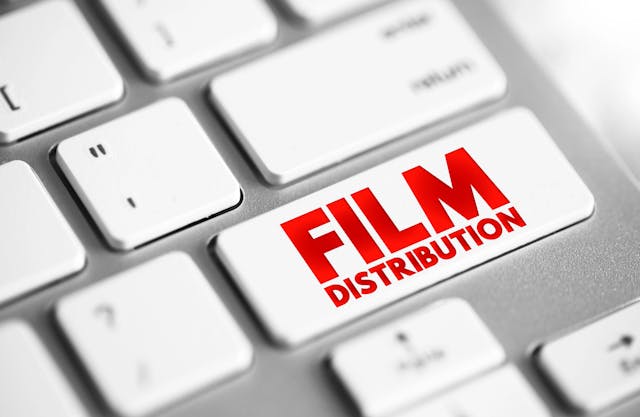The Strike is Over! What Does That Mean For Film Pros and Audiences?

Down time on the picket line: the strike is over. See you in three years! / Photo by Sheila Fitzgerald, courtesy of Dreamstime.
Good news, movie lovers and film production professionals! The SAG-AFTRA strike, which brought the American film industry to a halt, is officially over. Big blockbusters and low budget indie movies can shoot again. The 2024 film festival organizers can breathe easily now: stars will prance freely in their red carpets. On Thursday, November 9, representatives of the Screen Actors Guild and the American Federation of Television and Radio Artists announced a tentative agreement had been reached with the Alliance of Motion Picture and Television Producers (AMPTP). The new contract will be valid for three years. The full text will not be known until it is reviewed by the SAG-AFTRA National Board and submitted for the ratification vote of the membership. Technically, it is as good as approved. Bits and pieces of information seeps through media reports. We know this much is true.
Streaming the Benjamins
The agreement is valued at over $1 billion. That includes a new modality of residual income from streaming. Residuals are a very important source of income for actors. They generate a percentage of revenue from retransmitting films and movies on syndicated television networks and sales to foreign markets. They are almost a relic from another era. Gone are the days of a 20-something episode season. The bigger networks cut the production of fiction series and increased their reality shows. Furthermore, streaming content represented a loophole since proprietary content produced by Netflix and their like was designed to bypass that market. How that streaming bonus will be calculated is not yet known.

Streamers like Netflix bypassed the syndication market and altered the production landscape, costing actors & writers money. / Photo by Ekkiot Cowand, courtesy of Dreamstime.
Easing the AI Blues
A salient point in negotiations was how a performer's digitized likeness and voice could be used. Digitalization allows producers to scan an actor's body and recreate his image in different contexts. Recordings of their voice can be digitally altered and manipulated to create persuasive simulacra. A rough sign of things to come is the virtual resurrection of actor Harold Ramis for a climactic scene in "Ghostbusters: Afterlife" (2021). Ramis died in 2014. Louder alarm bells sounded off when living actors reported being scanned without consent. NPR published an interview with Alexandra Rubalcava, a background performer in the Disney/Marvel TV series "Wandavision," denouncing a creepy episode of corporate malfeasance. They were not given any information about how the date would be used and if and how they would be reimbursed for using their image.
If we go by the scary automatons Disney deployed in a crowd of extras in "Prom Pact" (Anya Adams, 2023), the technology seems dead on arrival. Alas, it has been around for a while. We are facing the evolution of CGI, zeroing in on detailed, up-close, and personal human beings. This is the expected progression of those multitudes of CGI "extras" that Ridley Scott conjured for "Gladiator" (2000) - we are about to see upgraded feats of illusion in his upcoming epic "Napoleon." Or the naked, masked models overlaid on the nasty bits in Stanley Kubrick's "Eyes Wide Shut" (1999).

"You are not CGI, are you, kid?": Ridley Scott and Joaquin Phoenix prepare a scene on location in "Napoleon" / Photo courtesy of Apple TV+.
Tech advancements are like Aladdin’s genie: once it’s out of the bottle, it is impossible to put them back in. As crude as the technology can be, it can only improve and partially displace human labor. An actor whose voice and likeness remain in the domain of a studio may see callbacks for reshoots and additional dialogue replacement dry out. No more income from dubbing lines in postproduction!
The ethics around the use of AI in creative industries is still in flux, but at least now, the studios will have to ask the performers before they can collect data and reuse it - in the new order, that's what we human beings are: data. We can only guess there will provisions for actors who, by the nature of a particular project, must be digitally scanned. Case in point: green-screen heavy films like super-hero blockbusters-wannabes and those that use the physical persona and their movements to create animated avatars, like, well, in "Avatar."
Is Acting Good For Your Health (Insurance)?
Legacy issues were addressed satisfactorily. In an interview with PBS Newshour, SAG-AFTRA president Fran Drescher confirmed they achieved increases to health insurance and retirement pension caps. Only up to %15 make enough money in a year to qualify for the minimum income threshold for health insurance currently at $24,470 yearly.
DIY Audition Video Is Getting Pricey
Self-taped auditions were also a sensible point. This convenience that came into fashion during the pandemic shutdown became a liability for actors. In a race to differentiate themselves from the competition, many performers feel compelled to invest considerable resources to improve the look of their videos. Gone are the days of using natural light from the window and your laptop's built-in camera. Now, people invest in renting equipment, hiring crew, and studio time to dress up their tryouts in a professional varnish. Does it make a difference? Hard to know. But we do know it costs money.
The Plight of The Working-Class Actor
There is a knee-jerk reaction among public opinion whenever actors strike, fed on by the belief that they are a bunch of millionaires throwing a tantrum can be pervasive. SAG-Aftra president Fran Drescher may be swimming in sweet passive income as producer and star of the popular sitcom “The Nanny,” which lasted six seasons from 1992 to 1998 and produced 145 episodes. Furthermore, it was sold to over 80 territories, and at least ten countries had their own culturally adapted version - including Russia! -. A musical theater adaptation is in development, too.

"The Nanny" of them all: as SAG-AFTRA president, Drescher went to the mat for her less wealthy colleagues. / Photo by Starstock-Dreamstime.
Drescher is an anomaly, and so are Brad Pitt, Angelina Jolie, and Joaquin Phoenix. The majority of actors are not big stars. They don't rake in the big bucks. Not even series regulars. SAG-AFTRA represents 160 thousand performers. About 7% make $ 80 thousand or more a year. The rest could qualify as working-class citizens. Think about that three years later, when this contract runs its course and negotiations begin anew.
The Biggest Losers: Studios & The City
During the strike, some studios framed losses as “savings,” in one of the least convincing and more cynical spins ever made. It was hardly surprising, though. It would have been out of character for the high executives that they were losing money for being greedy. Not just actors suffered from lack of income over the 118 days the strike lasted. Ancillary service industries were hit, too. Think of all the teamsters, caterers, make-up artists, stylists, drivers, and assorted service personnel that lost business with shootings and events canceled or actors tightening their belts to make it through the lean times. Analysts consider that during the Sag-Aftra and WGA strikes, California lost about $5 billion.

Trickle-down losses: greed turned the studios into the villains during the 2023 double strike. / Photo by Sheila Fitzgerald, courtesy of Dreamstime.
The View From The Audience Seats
Fans can expect an embarrassment of riches for 2024, with all the delayed premieres popping up like mushrooms. In the grand scheme of things, slowing the “Dune 2” premiere may sound frivolous. Tell that to theater owners, staring at a diminished Christmas season when the biggest blockbuster bets were delayed to 2024. To make things worse, Warner Brothers cut the legs off their runaway summer hit “Barbie” by sending it prematurely to Home Video VOD.
It was another tone-deaf move by top executive David Zaslav, who entered the fray alienating talent and fans by killing “Batgirl” in post-production, turning a female-led superhero franchise into a tax write-off. Almost a year later, he is doing the same with “Coyote Vs. Acme,” a comedy combining animation and live-action, featuring John Cena and legendary Looney Tunes characters. Would you trust this man with your likeness in perpetuity? I think not.
Watch “Lonely”
“Lonely” is a powerful reminder that no one is ever truly alone, and there is always someone out there who cares and wants to help.
Stream NowWant to get an email when we publish new content?
Subscribe today




























